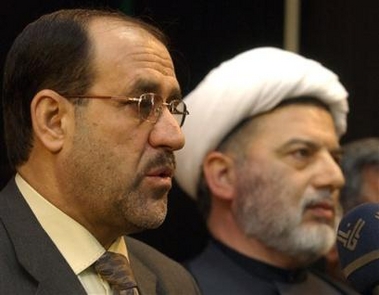|
Iraq Shiites can't agree on PM
(AP)
Updated: 2006-02-12 09:27
Shiite politicians failed to agree on a new prime minister Saturday, at least
briefly delaying a key step in forming a new government nearly two months after
national elections.
Elsewhere, a US Marine helicopter fired two rockets into an insurgent
hide-out in the western city of Ramadi, killing six militants, a Marine
spokesman said. Two roadside bombs targeted U.S. troops in Samarra, injuring one
American, the military said.

Senior Shiite
Alliance officials Jawad al-Maliki, left and Sheik Humam Hammoudi attend a
news conference in Baghdad, Saturday, Feb. 11, 2006. Members of the Shiite
alliance who won seats in parliament in the December election gathered
Saturday to discuss their choice for prime minister but postponed a vote
for at least a day at the request of Muqtada al-Sadr's faction.
[AP] | The 128 members of the Shiite alliance who
won parliament seats in the Dec. 15 balloting gathered Saturday in Baghdad to
choose a prime minister.
But the vote was postponed for at least a day at the request of the faction
loyal to the anti-U.S. cleric Muqtada al-Sadr because of differences with
another group, according to Shiites who attended the meeting.
Shiite officials, speaking on condition of anonymity because of the
sensitivity of the negotiations, said the al-Sadr faction was leaning toward
Prime Minister Ibrahim al-Jaafari.
Another Shiite group had doubts about al-Jaafari, and al-Sadr's lieutenants
wanted time to confer, the officials said.
The disagreement could strengthen the position of the other major candidate —
Vice President Adil Abdul-Mahdi, a French-educated former finance minister
backed by the country's top Shiite group, the Supreme Council for the Islamic
Revolution in Iraq.
The choice of the umbrella Shiite alliance is assured of becoming prime
minister because Shiites won the most parliament seats in national elections.
The alliance, however, is a collection of Shiite parties and factions with
individual agendas, not a cohesive organization.
The winning candidate will need a simple majority of the 128
parliamentarians.
After parliament convenes within two weeks, members must choose the largely
ceremonial position of president. The president then designates the alliance's
choice as the new prime minister, who has 30 days to appoint a Cabinet and win
majority approval in the legislature.
Once the Shiite alliance settles on a prime minister, it will begin talks in
earnest with parties representing Sunni Arabs, Kurds, secularists and others to
try to form a broad-based government, which the United States hopes can calm the
insurgency so American and other foreign troops can begin leaving.
The U.S. hopes the Shiites will offer key posts to Sunni Arabs, the backbone
of the insurgency, so they will support the government. Two Sunni Arab alliances
won 55 seats in December, a threefold increase over the outgoing parliament.
An coalition of two Kurdish parties allied with the Shiites in the outgoing
government won 53 seats.
The talks will take place amid rising tensions between Sunni Arabs and
Shiites following months of reprisal killings.
In Baghdad, a Sunni Arab tribal leader, Sheik Osama al-Jadaan, said his
followers have seized more than 1,400 "terrorists" in a three-month
counterinsurgency operation that began about a month ago along the Iraq- Syria
border.
U.S. authorities have recruited scouts from among al-Jadaan's tribe in an
effort to stop foreign fighters from infiltrating from Syria.
In the Anbar provincial capital of Ramadi, a U.S. Marine helicopter fired two
rockets Saturday into an insurgent hide-out, killing six militants and wounding
one, said Marine spokesman Capt. Jeffrey Pool.
The attack followed clashes between U.S. soldiers and militants near the
soccer stadium in Ramadi, 70 miles west of Baghdad.
In nearby Fallujah, 40 miles west of Baghdad, gunmen in a red sedan shot dead
a policeman Saturday, police said.
The body of an Iraqi Christian contractor who worked with the Americans was
found on a road in Kirkuk hours after he was seized by gunmen, police said. And
attackers entered a hospital in Hawija, 27 miles southwest of Kirkuk, fatally
shooting a doctor, police said.
In the southern city of Basra, the Iraqi army's local spokesman, Capt. Makram
al-Abbasi, was killed in gunfire from a civilian car accompanied by a police
vehicle. The British-controlled city has seen an upturn in violence in recent
weeks, in part fueled by Shiite militias that have infiltrated the police force.
A founding member of the main Kurdish militant group was killed when his car
exploded in the northern city of Sulaimaniyah, 160 miles northeast of Baghdad,
police said. Kani Yilmaz was once a senior member of the Kurdistan Workers
Party, or PKK, which has been leading an insurgency for more than two decades in
southeastern Turkey.
|